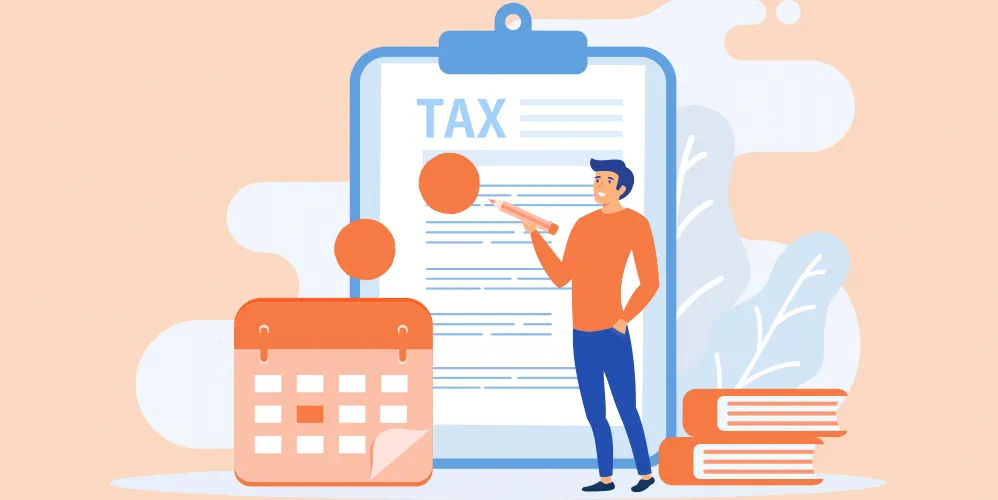
Short-Term Fixed Deposit: Meaning, Benefits & How It Works
02 जनवरी 2025

Table of Content
Introduction
A Short-Term Fixed Deposit (FD) is a popular investment option for individuals looking to earn a fixed interest rate on their savings over a brief period, typically ranging from 7 days to 1 year. Short-term FDs are favoured for their safety and the ability to earn higher interest rates compared to regular savings accounts. In this blog, we will explore the key features, benefits, and other essential details about short-term fixed deposits.
Key Features of Short-Term FDs
1. Tenure :
As the name suggests, short-term FDs have a shorter tenure, usually ranging from 7 days to 1 year.
2. Fixed Interest Rate :
The interest rate for short-term FDs remains constant throughout the deposit tenure, ensuring predictable returns.
3. Safety :
Short-term FDs are considered low-risk investments, with most banks offering insurance coverage for deposits up to ₹5 lakh under the Deposit Insurance and Credit Guarantee Corporation (DICGC).
4. Liquidity :
Though FDs are fixed deposits, many banks allow partial withdrawals or premature closure, providing flexibility when needed.
5. Automatic Renewal :
Most banks offer an automatic renewal option, allowing investors to extend their deposits seamlessly.
Benefits of Investing in Short-Term FDs
1. Stable Returns :
Short-term FDs provide fixed returns, making them an excellent option for risk-averse investors.
2. Liquidity :
With shorter tenures, you can access your funds quickly compared to long-term investments.
3. No Market Risk :
Unlike equities and mutual funds, short-term FDs are not affected by market fluctuations, providing peace of mind.
4. Ideal for Financial Goals :
Short-term FDs are perfect for short-term financial goals, such as funding vacations, buying appliances, or saving for emergencies.
5. Simple Process :
Opening a short-term FD account is straightforward and requires minimal documentation.
Eligibility for Short-Term FDs
Eligibility for short-term fixed deposits typically includes:
• Age Requirement :
Individuals aged 18 and above can open an FD account . Minors may open a joint account with a guardian.
• KYC Documentation :
Investors must submit Know Your Customer (KYC) documents, including identity proof, address proof, and a photograph.
• Minimum Deposit Amount :
Banks may have a minimum deposit requirement, usually ranging from ₹1,000 to ₹10,000.
Interest Rates on Short-Term FDs
Interest rates for short-term fixed deposits vary from bank to bank and can change frequently based on the economic environment and monetary policy. Typically, short-term FD rates range from 3% to 7% per annum. Bank of Baroda offers competitive interest rates, making it an attractive option for investors.
To calculate the potential earnings from your short-term FD, you can use a short-term FD calculator available on the Bank of Baroda’s website or through other financial platforms. This tool helps you estimate the interest earned based on the deposit amount, tenure, and applicable interest rate.
How to Open a Short-Term FD Account
Opening a short-term FD account with Bank of Baroda is a simple process. Here are the steps to follow:
1. Visit the Bank :
You can visit your nearest Bank of Baroda branch or access the bank’s website for online account opening. If you are existing customer, you can use Bank of Baroda’s “bobWorld Mobile” app and “bobWorld Internet” for FD account opening.
2. Fill Out the Application Form :
Complete the FD application form with the required details, including the deposit amount and tenure.
4. Deposit Amount :
Make the initial deposit as per the bank’s minimum requirement. This can be done through cash, cheque, or online transfer.
5. Receive FD Receipt :
Once processed, you will receive a Fixed Deposit receipt confirming your investment details.
Also Read: How To Open A Fixed Deposit Account
Alternatives to Short-Term FDs
While short-term FDs are a safe investment option, some alternatives may offer better returns or suit specific financial goals:
1. Recurring Deposits (RDs) cum Systematic Deposits Plan (SDPs):
Ideal for individuals who want to save a fixed amount regularly.
2. Liquid Mutual Funds :
These funds invest in short-term securities and offer potentially higher returns with moderate risk.
3. Savings Accounts with Higher Interest Rates :
Some banks provide savings accounts with attractive interest rates, offering liquidity without the lock-in period of FDs.
4. Ultra-Short-Term Debt Funds :
These funds invest in debt securities with short maturities, offering a balance of risk and returns.
Tips for Maximizing Returns from Short-Term FDs
1. Shop Around :
Compare interest rates from different banks to ensure you get the best return on your investment.
2. Consider Tax Implications :
Interest earned on FDs is taxable. Choose the tenure wisely to manage your tax liabilities.
3. Utilize the Power of Compounding :
Opt for cumulative FDs where interest is added to the principal, allowing for compounding benefits.
4. Plan for Liquidity Needs :
Choose the tenure based on your financial goals and liquidity needs to avoid penalties for premature withdrawal.
5. Take Advantage of Promotions :
Banks may offer promotional rates on FDs. Keep an eye out for such opportunities.
Also Read: What Is Tax Saving Fixed Deposit?
Conclusion
Short-term fixed deposits are an excellent investment option for individuals seeking stable returns with minimal risk. They offer the flexibility of liquidity while ensuring safety for your savings. Whether you are saving for a short-term goal or want to grow your funds without exposure to market volatility, short-term FDs can be a suitable choice. Bank of Baroda provides competitive rates and a hassle-free account opening process, making it easier to invest in your financial future.
Popular Articles
Related Articles










-
डिस्क्लेमर
इस लेख/इन्फोग्राफिक/चित्र/वीडियो की सामग्री का उद्देश्य केवल सूचना से है और जरूरी नहीं कि यह बैंक ऑफ बड़ौदा के विचारों को प्रतिबिंबित करे। सामग्री प्रकृति में सामान्य हैं और यह केवल सूचना मात्र है। यह आपकी विशेष परिस्थितियों में विशिष्ट सलाह का विकल्प नहीं होगा । बैंक ऑफ बड़ौदा और/या इसके सहयोगी और इसकी सहायक कंपनियां सटीकता के संबंध में कोई प्रतिनिधित्व नहीं करती हैं; यहां निहित या अन्यथा प्रदान की गई किसी भी जानकारी की पूर्णता या विश्वसनीयता और इसके द्वारा उसी के संबंध में किसी भी दायित्व को अस्वीकार करें। जानकारी अद्यतन, पूर्णता, संशोधन, सत्यापन और संशोधन के अधीन है और यह भौतिक रूप से बदल सकती है। इसकी सूचना किसी भी क्षेत्राधिकार में किसी भी व्यक्ति द्वारा वितरण या उपयोग के लिए अभिप्रेत नहीं है, जहां ऐसा वितरण या उपयोग कानून या विनियमन के विपरीत होगा या बैंक ऑफ बड़ौदा या उसके सहयोगियों को किसी भी लाइसेंसिंग या पंजीकरण आवश्यकताओं के अधीन करेगा । उल्लिखित सामग्री और सूचना के आधार पर किसी भी वित्तीय निर्णय लेने के लिए पाठक द्वारा किए गए किसी भी प्रत्यक्ष/अप्रत्यक्ष नुकसान या देयता के लिए बैंक ऑफ बड़ौदा जिम्मेदार नहीं होगा । कोई भी वित्तीय निर्णय लेने से पहले अपने वित्तीय सलाहकार से सलाह जरूर लें।
Fixed Deposit: A Smart and Safe Investment Option
In the world of investing, safety and returns are often the two main concerns for individuals looking to grow their wealth. One investment option that strikes a balance between these two factors is the Fixed Deposit (FD). In this blog, we will explore why investing in FDs is a smart choice for both conservative and strategic investors.
IPO: Understanding Initial Public Offerings and How They Work |
When companies grow and need to raise capital, they often turn to the public markets. One of the most common methods for doing so is through an Initial Public Offering, commonly known as an IPO. Understanding what an IPO is, how it works, and its potential benefits and risks is crucial for anyone considering investing in the stock market.

